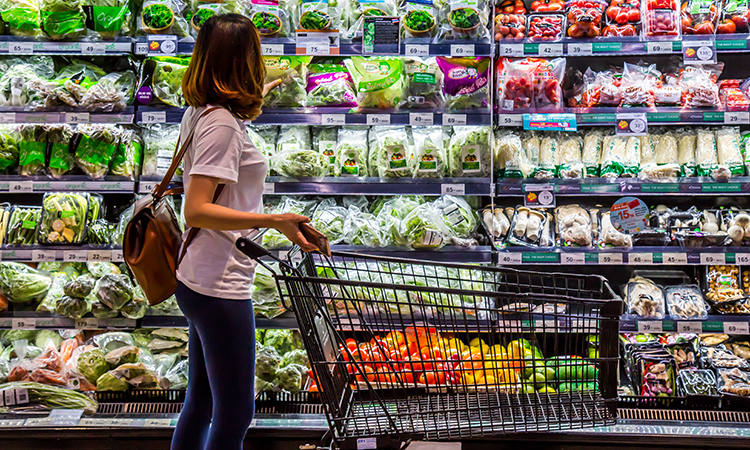Less than half of Europeans trust in food, says new study
- Like
- Digg
- Del
- Tumblr
- VKontakte
- Buffer
- Love This
- Odnoklassniki
- Meneame
- Blogger
- Amazon
- Yahoo Mail
- Gmail
- AOL
- Newsvine
- HackerNews
- Evernote
- MySpace
- Mail.ru
- Viadeo
- Line
- Comments
- Yummly
- SMS
- Viber
- Telegram
- Subscribe
- Skype
- Facebook Messenger
- Kakao
- LiveJournal
- Yammer
- Edgar
- Fintel
- Mix
- Instapaper
- Copy Link
Posted: 23 May 2024 | Leah Hockley | No comments yet
The latest EIT Food Trust Report has found that declining trust in food is likely to be the reason behind consumers making less healthy and sustainable food choices.


A new study of 19,642 consumers across 18 countries has revealed that fewer consumers report making healthy and sustainable food choices, against a backdrop of declining trust in the food sector.
The latest EIT Food Trust Report, now in its sixth year, shows that less than half (45%) of Europeans say that they have trust in food, related to the taste, safety, health, authenticity and sustainability of our food system.
The report was developed by the EIT Food Consumer Observatory, which drives transformation to a healthier, more sustainable and more resilient food system by providing consumer insights and guidance. EIT Food is supported by the European Institute of Innovation and Technology (EIT), a body of the European Union (EU), and the study was conducted by a consortium of pan-European academic partners.
The study showed that, while consumers are mostly confident that the food that they eat is safe (53%), they are more sceptical about its sustainability and healthiness. Only a third (36%) of consumers believe that the food they eat is sustainable, while less than half (44%) believe it is healthy.
This scepticism around sustainability may be driving a decline in motivations for consumers to actively try and lead a sustainable lifestyle. In 2020, nearly eight in 10 consumers (78%) reported that they intended to live a sustainable lifestyle, but that has since dropped steadily to 71%.
When it comes to food choices, this is even lower – with less than half of consumers (49%) reporting that they take the environmental impact of their diet into account when choosing what to eat. This is compared to 51% in 2020 and 2021, and 48% in 2022.
Consumers’ intentions to eat healthily has also been declining for the past few years – with 56% of consumers now reporting that they try and eat healthily, compared to 60% in 2020 and 2021.
The study also indicates that this scepticism and distrust applies to food innovation – as only a third of consumers (34%) say that they are open to new food products. Younger consumers, however, are much more open to food innovation, with 44% of 18- to 34-year-olds reporting that they are open to new food products, compared to just 24% in the 55+ age group. This demonstrates that the next generation may be much more willing to embrace new food products that are designed to contribute to healthier and more sustainable diets.
The report also demonstrates a decline in consumer trust in the overall food sector, in terms of the competency, openness and care of food sector actors, such as farmers, manufacturers, authorities, restaurants and retailers.
Farmers remain the most trusted group in the food sector, with 65% of consumers expressing trust in this group. However, this represents a slight drop from the previous year (67%), driven by a decline in beliefs about the competence of farmers. Two thirds (67%) of consumers now believe that farmers are doing a good job, down from 69% in 2023 – however, this still represents the highest score of any food sector group. Farmers also received the highest scores of any group for being open (54%) and demonstrating that they care about consumers and act in the public interest (53%).
Retailers are the second most trusted group, with half (50%) of consumers reporting that they trust retailers – a drop from 52% in 2022.
Restaurants and caterers were scored at 48%, down from 49% in 2023. While over half of consumers agreed that restaurants and catering are doing a good job (54%), consumers did not rate them as highly on their demonstrations of caring about the public (44%) or their openness in preparing and selling food (39%).
Less than one in two, meanwhile, trust food manufacturers or authorities (government agencies at both national and EU levels). The report shows that just 46% and 45% of consumers state that they trust food manufacturers and authorities respectively – down from 48% in 2021 – while 27% and 32% respectively actively mistrust them.
What’s more, only four in 10 (38%) of consumers believe that food manufacturers care about people’s concerns, while just 37% feel that they are open and honest about how they prepare and sell food.
This was much the case for perceptions about authorities, too, with just over a third of consumers believing that authorities care about and listen to what ordinary people think about food (38%), or that they are sufficiently open about how they regulate food production (37%).
“The food sector has faced unprecedented challenges in recent years, and will continue to do so as climate change takes its toll on food production. Now, more than ever, we need partnership between the food sector and Europe’s citizens if we are to create a healthier and more sustainable food system for everyone. To achieve this, we need to understand and work with consumers to foster trust and engagement in embracing food innovations and making conscious choices about what to eat,” said Sofia Kuhn, Director of Public Insights and Engagement at EIT Food.
“Consumers need to be able to trust that the food they eat is both good for them, and good for the planet. If we are to support people to make long-term changes to how they eat, we need the food sector to work with consumers to provide better information, options and access for diets that are healthy, nutritious and sustainable – while being affordable and inclusive for everyone,” said Klaus G. Grunert, Professor of Marketing at Aarhus University and Lead of the EIT Food Consumer Observatory.
Related topics
Food Safety, Health & Nutrition, Packaging & Labelling, Research & development, retail, Sustainability
Related organisations
EIT Food, European Institute of Innovation and Technology (EIT), European Union (EU)









